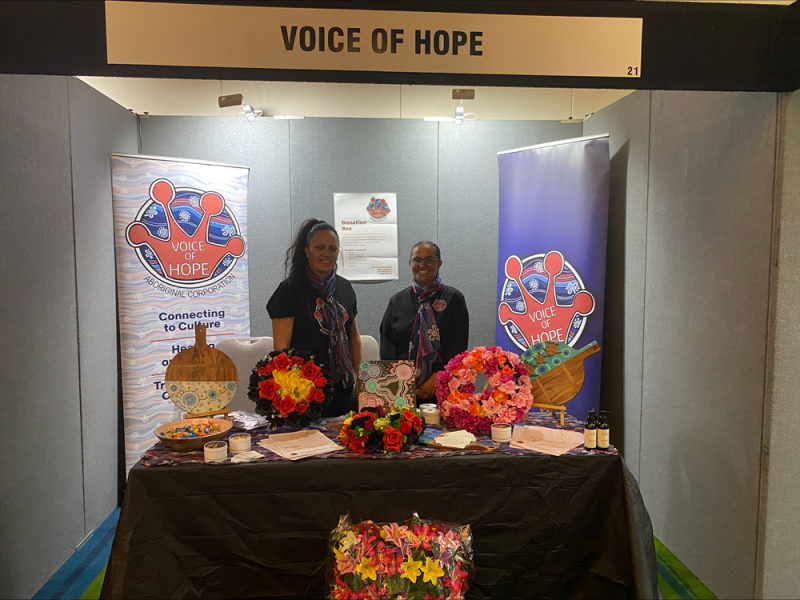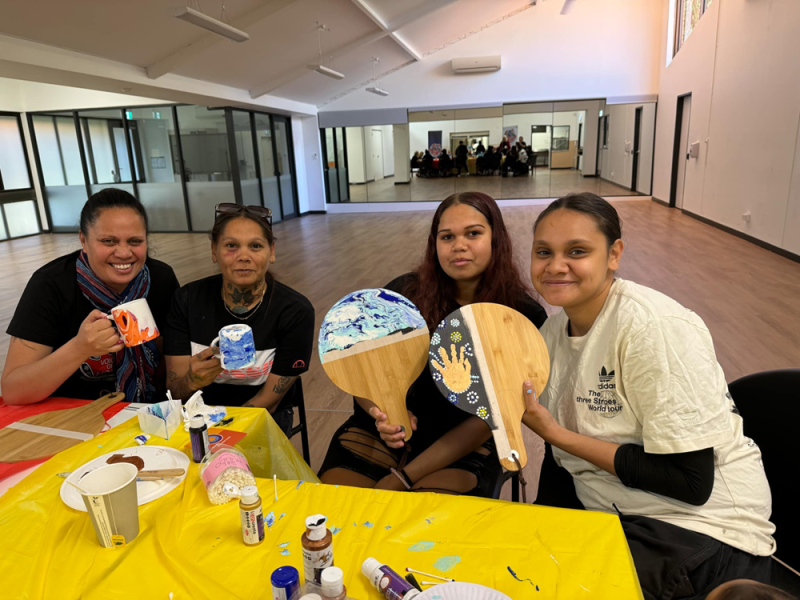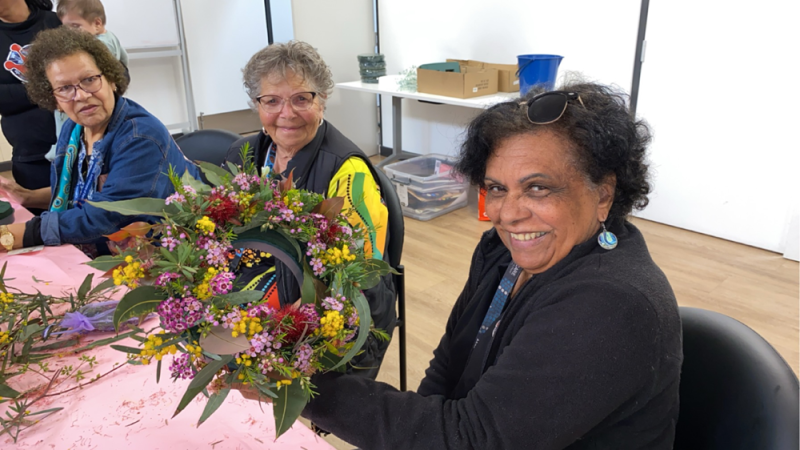A voice of hope for women in WA
Each Monday, Voice of Hope Aboriginal Corporation welcomes up to 40 First Nations women to a healing workshop. It’s a chance to yarn, heal and create connections, with the goal of returning to community strong after prison.
Voice of Hope embodies an ambition by founder Lorraine Pryor: to provide a wrap-around service for incarcerated women and sistergirls to have ‘hope for when they are released’. It’s a response to Lorraine seeing a need for Aboriginal women-led services in the justice system – services grounded in culture and women’s business.

Anna Te Nahu and Lorraine Pryor
Leading with Elder knowledge
In 2 years, Voice of Hope Aboriginal Corporation has grown to a busy team of volunteers with a governance model founded in culture and Elder knowledge. The corporation is led and delivered for Aboriginal women, by Aboriginal women.
‘Growing took a while,’ Lorraine reflects. ‘My mum was always by my side as my Elder to give me directions and to have the knowledge to make this organisation culturally safe, and she advised on cultural obligations as Aboriginal women for our community.
‘Our Elders are pivotal to our development, our growth, our knowledge. We must have them on our sides through this journey so that we understand and carry the cultural needs of our people.’
Healing with lived experience
Lorraine incorporates her own experience of incarceration into creating the services, which include weekly healing workshops for women in prison. The board is also made up of women with lived experience.
Women who attend the workshops are often impacted by domestic violence and intergenerational trauma. Voice of Hope guides the workshops using experience and drawing on culture – through yarning, connecting and practising traditions together.
‘My mother was a mission girl and I used to be incarcerated myself,’ says Lorraine.
‘I was carrying intergenerational trauma. We educate our people to make them stronger in themselves so they can address the issue and not reoffend. That’s why we’ve created this wrap-around service for our women. We know what’s best for our women. We all know how to work with each other.’

Anna TeNahu with Jade Wallam and daughters
The corporation has 7 women on its board of directors – 5 are Aboriginal women. The board also consults an all-women Elders advisory group, and the members are women who have come out of prison and are on a journey of recovery.
Going from one passionate person to an in-demand team of volunteers happened through hard work and relationship building. Lorraine says the tools provided by ORIC took some of the stress out of setting up the corporation’s rules and structure.
‘We’ve had to build ourselves from the ground up. There were no policies and procedures,’ says Lorraine. ‘We’ve had to write our risk management, our conflicts of interest, all the legal paperwork to create this organisation and keep it running smoothly.
‘We follow ORIC’s advice for this and things like ABNs, and the structural framework with the rule book, but we made it our own.’
Strength in traditions
Cultural practices carry through the way the corporation is governed, with directors meeting every Noongar season – 6 seasons a year. The women also learn traditional practices such as weaving to aid healing.
‘We do our welcomes and our blessings at the start of meetings,’ says Lorraine. ‘We’ve got generations of women to learn how to do wreathmaking. This is women’s business and we want to bring women’s business back alive again for our women.’

Aunty Lynette Sandy, Aunty Margaret Taylor Yarran and Aunty Marie Pryor
Voice of Hope also makes sure culture is a priority with non-Indigenous partners, including government and the prison, to get the work done. Lorraine says Voice of Hope respectfully leads these partnerships with Indigenous governance practices.
‘We all help and carry the load. We have great stakeholders who support our organisation – a mix of Indigenous and non-Indigenous. We must work with both to educate them and them to see how we work.’
Support in community
Voice of Hope volunteers help with practical things, like clothing, toiletries, phones and vouchers, so women have basics as they return to the community. They also help with identity documents or ‘a police clearance, which might be the only thing stopping them from getting a job’.
‘A holistic approach also involves accommodation and reunification with their children,’ explains Lorraine. ‘It’s vital their family also understand how they can help each other on this journey to break the cycle.’
On top of its wrap-around support service, Lorraine speaks at prisons and is an advocate for cultural healing strategies and programs in prisons. As Voice of Hope continues to grow, and gets busier, Lorraine sees the next step as moving into their own space – and hopefully setting up payroll.
‘We’ve had little donations here and there but now we’re smashing out submissions,’ Lorraine says. ‘My house is the office, so we need an office space – and to have fulltime employees. This is not 9 to 5, 5 days a week job. We’ve got women going in and out of prison on the weekends and I can get phone calls at all times of the day and night.’
Aboriginal-led solutions are the future
Through the hard work, Lorraine continues to drive forward with strength in her vision and a desire to show that Aboriginal women-led services are the way to get better outcomes for Aboriginal women.
‘Aboriginal led organisations are the future. If we can’t build a village to help our community, we’re going to struggle, so we need to build and create our village to make it stronger and make change in our direction and navigate a new pathway,’ Lorraine says.
‘We know the challenges and barriers for Aboriginal women, and we can collaboratively heal, talk and support each other on the journey of recovery from substance abuse or domestic violence. We don’t want alcohol and drugs and jail. We want to be here living a healthy happy life.’